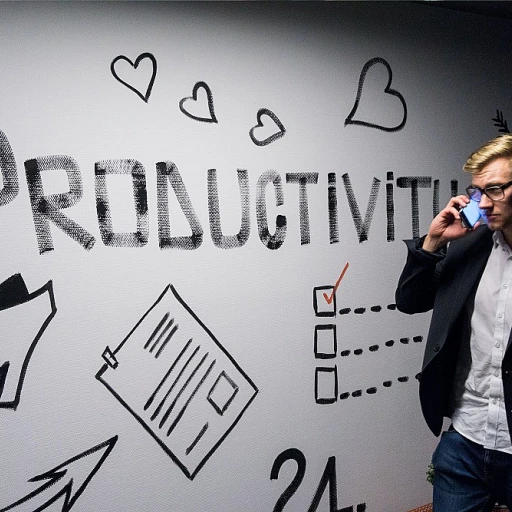
Understanding Applicant AI
Decoding the Mechanics of AI in Applicant Screening
The advent of artificial intelligence has redefined how organizations navigate the hiring process. Applicant AI, particularly within recruitment, leverages data-driven algorithms to optimize the evaluation of candidates. This technology doesn't merely enhance the speed of recruitment but augments its precision. It ensures companies effectively identify top talent that aligns with their needs. Applicant AI plays a pivotal role in applicant tracking systems (ATS). These systems streamline recruitment by utilizing AI-powered software to oversee the resume screening process, thereby refining applicant matching. With each job description, the AI analyzes skills, qualifications, and employment history to identify the best candidates for a role. As the recruitment landscape evolves, these AI systems are tailored to manage real-time tracking, making recruitment both time-efficient and precise. Moreover, the integration of AI into applicant tracking bolsters the capabilities of recruitment CRM systems. This synergy leads to a more holistic recruitment process, where bias is minimized, and objectivity is amplified. However, the transition to AI-powered ATS is not just about technology; it's about refining the entire candidate journey – something that will be explored further when we discuss personalizing the candidate experience. For those exploring solutions within the realm of recruiting software, our guide on common campus recruiting software offers insights into integrating AI into recruitment processes, ensuring candidates experience a seamless hiring journey.The Role of AI in Streamlining Recruitment
Streamlining the Recruitment Process with AI
In today's competitive job market, the recruitment process can be a daunting task for both recruiters and candidates. Leveraging artificial intelligence (AI) can significantly enhance this process, making it more efficient and effective. AI-powered applicant tracking systems (ATS) are at the forefront of this transformation, offering a data-driven approach to recruitment that helps identify top talent quickly and accurately.
AI plays a crucial role in automating various stages of the hiring process, from resume screening to candidate matching. By analyzing vast amounts of data in real time, AI systems can identify the best candidates based on job descriptions and requirements, reducing the time spent on manual screening. This not only speeds up the recruitment process but also minimizes the risk of bias, ensuring a fairer and more inclusive hiring journey.
Efficiency and Accuracy in Candidate Screening
One of the significant advantages of using AI in recruitment is its ability to enhance the accuracy of candidate screening. Traditional methods often rely on human judgment, which can be subjective and prone to errors. AI-powered ATS systems, on the other hand, utilize advanced algorithms to evaluate applicants objectively, ensuring that only the most suitable candidates are shortlisted.
Moreover, AI can continuously learn and adapt from previous recruitment cycles, refining its processes to improve future hiring decisions. This ongoing optimization ensures that recruitment software remains aligned with the evolving needs of the organization, making it an invaluable tool for talent acquisition teams.
Reducing Time-to-Hire with AI-Driven Solutions
Time is of the essence in the recruitment world, and AI-driven solutions are instrumental in reducing time-to-hire. By automating repetitive tasks and streamlining the recruitment process, AI allows recruiters to focus on more strategic aspects of talent acquisition. This not only enhances the candidate experience but also ensures that organizations can secure the best talent before competitors do.
For a deeper understanding of how AI is revolutionizing recruitment, you can explore insights on enhancing employee policy search with Gen AI solutions. This resource provides valuable perspectives on the transformative impact of AI in the recruitment landscape.
Personalization Through AI
Customizing the Journey with Artificial Intelligence
The application of artificial intelligence in recruitment is revolutionizing how companies engage with their candidates. The integration of AI-powered systems into the recruitment process enables a more refined and personalized experience for every applicant. Traditional methods reliant on generic templates are increasingly being replaced by dynamic solutions that adapt to individual candidate profiles. Personalization in the hiring process begins right from the job description stage. AI can analyze vast amounts of data to tailor job postings that resonate with the desired talent pool, ensuring clarity and relevance. This arm of recruitment tech doesn't stop at attracting candidates; it continues throughout the candidate's journey. From resume screening to communicating the next steps, AI allows recruiters to provide real-time updates tailored to individual applications. This ensures candidates do not feel like they are navigating through a faceless applicant tracking system, but rather a thoughtfully curated experience. AI facilitates better candidate matching by analyzing applicants’ skills, experiences, and preferences, thus presenting recruiters with the top talents that align closely with the company's needs and values. This intelligent matching process reduces time-to-hire significantly, ensuring that candidates spend less time in lengthy recruitment procedures and more time contributing to their new roles. Beyond immediate benefits, there are critical considerations in balancing personalization with fairness. While AI reduces the risk of unconscious bias in hiring decisions, ensuring the system's algorithms are checked and improved regularly serves to maintain fairness and transparency in the process. Adapting to AI-powered ATS solutions not only facilitates a smoother hiring journey but also strengthens an organization’s talent acquisition strategy. Recruits become more than just data points, as the recruitment process evolves into an engaging, respectful, and ultimately more successful interaction.Challenges and Ethical Considerations
Overcoming the Ethical Challenges of AI in Recruitment
The integration of artificial intelligence into the recruitment process offers remarkable advantages, such as enhanced efficiency and personalization. However, this integration is not without its challenges. One of the primary concerns in deploying AI-powered recruitment systems is the potential for bias. Ensuring that algorithms used in applicant tracking systems are free from implicit bias is crucial to maintaining fair hiring practices. Organizations must regularly audit their AI tools to ensure they don't inadvertently disadvantage candidates based on gender, ethnicity, or other protected characteristics. Moreover, the reliance on data-driven decisions necessitates stringent data privacy measures. As applicant tracking systems collect and analyze vast amounts of personal data during the resume screening and candidate matching phase, it is imperative for companies to safeguard candidate information against breaches and misuse. The commitment to transparency in how data is utilized in the recruitment process can build trust with candidates and protect the organization's reputation. Another ethical consideration lies in the impact of AI on the human element of recruiting. While AI systems are instrumental in reducing time-consuming tasks and enhancing the speed of the recruitment process, the human touch in hiring decisions remains integral. Striking a balance between technology and human judgment can ensure top talent feels valued and respected, thus improving the overall candidate experience. In addressing these challenges, organizations must focus on developing best practices for ethical AI use. This includes investing in ongoing training for recruitment teams to effectively leverage AI tools and establishing clear protocols around the use of AI in the hiring process. By cultivating a robust ethical framework for AI-powered recruitment, companies can harness the full potential of technology while respecting the dignity and rights of all candidates involved.Measuring the Impact of AI on Candidate Experience
Assessing the Influence of AI on Candidate Interactions
The integration of AI into the recruitment process has significantly transformed how talent is identified and managed, impacting candidate experiences in various ways. To truly understand this influence, it’s crucial to measure the effects AI has on each stage of the hiring journey. Recruitment systems powered by AI technology have streamlined the hiring process, enhancing efficiency through applicant tracking and resume screening. By automating time-consuming tasks, such systems allow recruiting teams to focus more on strategic decision-making rather than administrative duties. However, to gauge the impact on candidates, it is important to analyze specific metrics that capture AI’s role in personalizing interactions with applicants.- Time to Hire: Reduced timelines are often a direct result of AI systems automating tasks like job description analysis and candidate matching. Tracking this metric provides insight into the speed at which candidates move through the recruitment funnel.
- Candidate Satisfaction: Utilizing AI can lead to more every curated job matches, which directly affects candidate satisfaction. By harnessing data-driven algorithms, candidates experience a more tailored recruitment process.
- Bias Reduction: While AI promises to diminish bias through objective data analysis, it is essential to monitor and audit recruiting software to ensure implicit biases are not perpetuated in decision-making processes.
- Accuracy in Hiring Decisions: AI-powered applicant tracking systems need to be evaluated for their effectiveness in predicting candidate success and retention rates, thus assessing whether the top talent recruited is the perfect fit for the organization.
Future Trends in Applicant AI
Anticipating the Evolution of AI in Recruitment
The integration of artificial intelligence in the recruitment process is not just a passing trend; it's a transformative force reshaping how organizations attract and retain top talent. As we look to the future, several trends are poised to redefine the candidate experience.
AI-Driven Personalization and Engagement
With advancements in AI, the ability to personalize the candidate journey will become even more sophisticated. AI-powered systems will leverage data-driven insights to tailor job descriptions and communication, ensuring candidates feel valued and understood throughout the hiring process. This will enhance engagement and improve the overall candidate experience.
Real-Time Data Analytics
The future of applicant tracking systems (ATS) will be heavily influenced by real-time data analytics. By harnessing the power of AI, recruiting software will provide actionable insights into candidate behavior and preferences, enabling recruiters to make informed hiring decisions quickly. This data-driven approach will streamline the recruitment process and reduce time-to-hire.
Reducing Bias with AI
One of the most promising aspects of AI in recruitment is its potential to minimize bias. As AI systems become more advanced, they will offer unbiased candidate screening and matching, ensuring that the best candidates are identified based on merit rather than subjective judgment. This will lead to a fairer and more inclusive hiring process.
Integration with ATS and CRM Systems
Future AI developments will see deeper integration with ATS and CRM systems, enhancing the efficiency of the recruitment process. These integrations will facilitate seamless communication between different software platforms, improving the overall tracking of applicants and making the recruitment process more cohesive.
The Role of AI in Talent Acquisition
As AI continues to evolve, its role in talent acquisition will expand. AI-powered ATS will not only assist in resume screening but also in predicting candidate success and cultural fit. This predictive capability will enable organizations to make more strategic hiring decisions, ultimately improving the quality of hires.
In conclusion, the future of applicant AI is bright, with numerous advancements on the horizon that promise to enhance the candidate experience. By embracing these innovations, organizations can stay ahead in the competitive landscape of talent acquisition.












